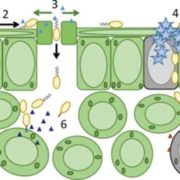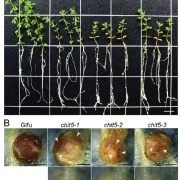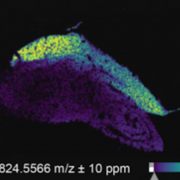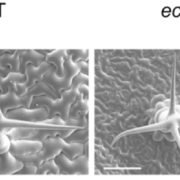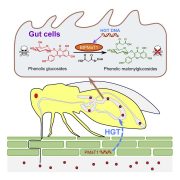Herbivore-deterring trichomes persist with the help of Woolly and Get02
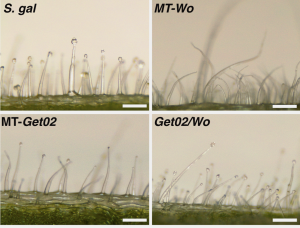 Type-IV glandular trichomes, which produce acylsugars, are effective deterrents against herbivory in Solanum, but they only persist in the juvenile stage of the cultivated tomato (S. lycopersicum). Therefore, these trichomes serve as a marker for the transition from juvenile to adult phases in developmental studies, as previously discovered by Vendemiatti et al. (2017). Now, Vendemiatti et al. have taken two strategies to promote acylsugar-based herbivory resistance in tomato. First, they mapped and introgressed a key locus from a tomato wild relative, S. galapagense that controls the capacity to harbor adult-persisting type-IV trichomes. In the resulting plants, MT-Get02 (Micro-Tom-Galapagos enhanced trichome 02), these trichomes are retained into the adult phase. However, the MT-Get02 plants only display about half as many type-IV trichomes as the parental S. galapagense plants. In S. lycopersicum, a mutation in the gene WOOLLY (Wom) leads to a considerable increase in the number of trichomes. The authors stacked the Wom mutation onto MT-Get02 and achieved plants with a high density of type-IV trichomes in both juvenile and adult phases, compared to the wild species. Interestingly, S. galapagense´s acyl-sugar composition differed from that of Get02/Wo plants, yet their quantities were similar, despite the lower density of type-IV in the wild species. This suggests the presence of additional factors influencing insect resistance in S. galapagense, such as specific acylsugar biosynthesis pathways and the capacity of acylsugar production per gland. Moreover, the combination of just two loci was sufficient to confer greater herbivory resistance to Get02/Wo plants compared to the S. lycopersicum parent, making it a significant breakthrough in overcoming the polygenic nature of insect resistance in tomatoes. And if you’d like to read more on Woolly’s role in trichome development, see the recently accepted The Plant Cell paper, “A gradient of the HD-Zip regulator Woolly regulates multicellular trichome morphogenesis in tomato” 10.1093/plcell/koae077. (Summary by Mary Williams @PlantTeaching) Plant Physiol. 10.1093/plphys/kiae128
Type-IV glandular trichomes, which produce acylsugars, are effective deterrents against herbivory in Solanum, but they only persist in the juvenile stage of the cultivated tomato (S. lycopersicum). Therefore, these trichomes serve as a marker for the transition from juvenile to adult phases in developmental studies, as previously discovered by Vendemiatti et al. (2017). Now, Vendemiatti et al. have taken two strategies to promote acylsugar-based herbivory resistance in tomato. First, they mapped and introgressed a key locus from a tomato wild relative, S. galapagense that controls the capacity to harbor adult-persisting type-IV trichomes. In the resulting plants, MT-Get02 (Micro-Tom-Galapagos enhanced trichome 02), these trichomes are retained into the adult phase. However, the MT-Get02 plants only display about half as many type-IV trichomes as the parental S. galapagense plants. In S. lycopersicum, a mutation in the gene WOOLLY (Wom) leads to a considerable increase in the number of trichomes. The authors stacked the Wom mutation onto MT-Get02 and achieved plants with a high density of type-IV trichomes in both juvenile and adult phases, compared to the wild species. Interestingly, S. galapagense´s acyl-sugar composition differed from that of Get02/Wo plants, yet their quantities were similar, despite the lower density of type-IV in the wild species. This suggests the presence of additional factors influencing insect resistance in S. galapagense, such as specific acylsugar biosynthesis pathways and the capacity of acylsugar production per gland. Moreover, the combination of just two loci was sufficient to confer greater herbivory resistance to Get02/Wo plants compared to the S. lycopersicum parent, making it a significant breakthrough in overcoming the polygenic nature of insect resistance in tomatoes. And if you’d like to read more on Woolly’s role in trichome development, see the recently accepted The Plant Cell paper, “A gradient of the HD-Zip regulator Woolly regulates multicellular trichome morphogenesis in tomato” 10.1093/plcell/koae077. (Summary by Mary Williams @PlantTeaching) Plant Physiol. 10.1093/plphys/kiae128


